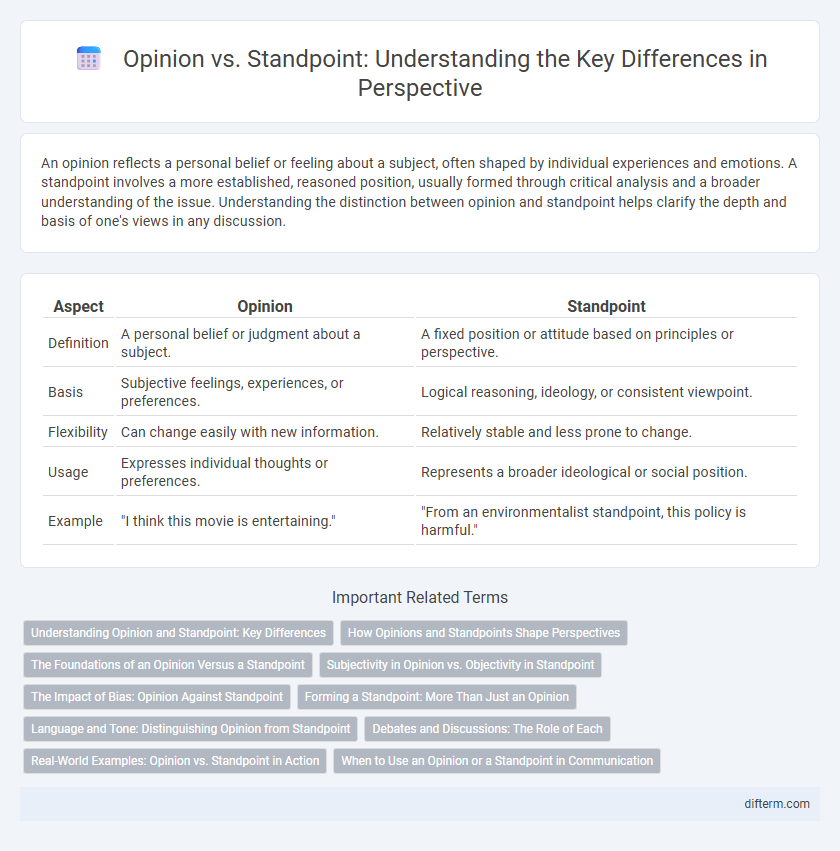An opinion reflects a personal belief or feeling about a subject, often shaped by individual experiences and emotions. A standpoint involves a more established, reasoned position, usually formed through critical analysis and a broader understanding of the issue. Understanding the distinction between opinion and standpoint helps clarify the depth and basis of one's views in any discussion.
Table of Comparison
| Aspect | Opinion | Standpoint |
|---|---|---|
| Definition | A personal belief or judgment about a subject. | A fixed position or attitude based on principles or perspective. |
| Basis | Subjective feelings, experiences, or preferences. | Logical reasoning, ideology, or consistent viewpoint. |
| Flexibility | Can change easily with new information. | Relatively stable and less prone to change. |
| Usage | Expresses individual thoughts or preferences. | Represents a broader ideological or social position. |
| Example | "I think this movie is entertaining." | "From an environmentalist standpoint, this policy is harmful." |
Understanding Opinion and Standpoint: Key Differences
Opinion reflects a personal belief or judgment shaped by individual experiences and emotions, often fluctuating based on new information. Standpoint represents a more structured position grounded in broader social, cultural, or ideological frameworks, providing a stable lens through which opinions are interpreted. Understanding the distinction between opinion and standpoint enhances critical thinking by clarifying subjective views versus principled perspectives.
How Opinions and Standpoints Shape Perspectives
Opinions reflect personal beliefs influenced by emotions and experiences, while standpoints represent a more structured position grounded in context and values. Both opinions and standpoints shape perspectives by guiding how individuals interpret information and interact with the world. Understanding this distinction enhances critical thinking and fosters more meaningful dialogue.
The Foundations of an Opinion Versus a Standpoint
The foundations of an opinion are often rooted in personal beliefs, feelings, and subjective experiences, reflecting individual perspectives and emotional responses. In contrast, a standpoint is founded on a more structured framework, grounded in critical analysis, cultural context, and often tied to social positions or ideological commitments. Understanding these distinctions clarifies how opinions express personal views while standpoints represent informed, collective perspectives shaped by broader awareness and critical reflection.
Subjectivity in Opinion vs. Objectivity in Standpoint
Opinion reflects personal beliefs shaped by emotions and individual experiences, emphasizing subjectivity and variability. Standpoint involves a reasoned, evidence-based perspective, highlighting objectivity and consistency in judgment. Understanding this distinction clarifies communication and decision-making in diverse contexts.
The Impact of Bias: Opinion Against Standpoint
Bias significantly skews opinions, leading to subjective views that reflect personal prejudices rather than objective facts, whereas standpoints more clearly define a reasoned and consistent position grounded in evidence. Opinions are often fluid and influenced by emotions or social contexts, causing variability and less reliable bases for decision-making. Standpoints provide a structured framework to critically assess information, minimizing the distortion that bias introduces in forming judgments.
Forming a Standpoint: More Than Just an Opinion
Forming a standpoint involves critical evaluation and synthesis of information beyond merely expressing an opinion, which is often subjective and personal. A standpoint is grounded in reasoning and evidence, reflecting a well-considered position on a topic. Developing a standpoint requires integrating multiple perspectives to establish a coherent and defensible view.
Language and Tone: Distinguishing Opinion from Standpoint
Opinion reflects personal beliefs expressed with subjective language and flexible tone, often revealing emotional nuances and individual perspective. Standpoint embodies a more fixed, strategic position articulated through authoritative and assertive language, highlighting commitment to a specific framework or ideology. Distinguishing between the two hinges on analyzing language intensity and tone consistency to discern transient personal views from stable, strategic assertions.
Debates and Discussions: The Role of Each
Opinions express personal beliefs or feelings, often shaping individual perspectives during debates, while standpoints represent broader, socially or culturally influenced positions that frame arguments. In discussions, opinions provide subjective insights that fuel dialogue, whereas standpoints offer a structured lens through which issues are analyzed and contested. Recognizing the distinction enhances clarity, allowing participants to navigate complex debates with a deeper understanding of underlying motivations and context.
Real-World Examples: Opinion vs. Standpoint in Action
Opinions reflect personal beliefs shaped by individual experiences, such as preferring a specific smartphone brand based on usability, while standpoints represent broader perspectives influenced by social or cultural contexts, like advocating for digital privacy rights in policymaking. In the real world, an employee's opinion on workplace flexibility might differ from a trade union's standpoint emphasizing worker protections across industries. These distinctions highlight how opinions are subjective and situational, whereas standpoints provide collective frameworks guiding consistent ideological approaches.
When to Use an Opinion or a Standpoint in Communication
Opinion expresses a personal belief or feeling based on individual experiences, making it suitable for informal conversations and persuasive writing. Standpoint conveys a more structured, often ideological position reflecting a broader perspective or social context, useful in academic discussions and debates. Choosing between opinion and standpoint depends on the communication goal: subjective expression favors opinion, while objective analysis requires a standpoint.
opinion vs standpoint Infographic

 difterm.com
difterm.com